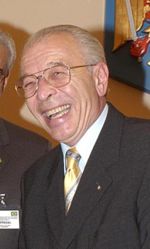Mihai Popeşcu

|
| Mihai Popeşcu | |
| Portrait | 
|
| Head Strategist of the Greek Armed Forces | |
| General in the Greek Army | |
| Reign: | February 23rd, 2008-December 31st, 2014. |
| Predecessor: | Position created |
| Successor: | Incumbent |
| Birth: | 5/29/1936 |
| Profession: | Soldier, Professor, Author |
| Political Party: | The Imperialist Party |
| Relgious Affiliation: | Eastern Orthodox Church (formerly Sunni Muslim and Oltenian Greek Catholic Church |
| Wife | Maria Magdalena Ghazaryan/Lăzărescu |
| Second In Command | |
| Spoken Languages | Greek, Romanian, English, Hungarian, Turkish, Uyghur, and Arabic, |
Mihai Popescu (aka "Mīkhā'īl ibn Imām or Imamescu) was born the 29th of May, 1936 in the village of Sărata-Monteoru near Buzău into a poor, strict family of Uniate Catholics from Oltenia. His childhood was an unhappy one and when he was drafted into the military at the age of 17 (having lied about his age to get out of Sărata early), he was eager to be sent to Bucharest for training. Popescu had a natural talent for military strategy and he proved to be one of the Romanian military academy's brightest pupils. He was honorably discharged in March of 1963 after he got into a fistfight with a superior regarding his orders. It was only through the intercession of a colonel he befriended that he did not receive a dishonorable discharge. Utterly dejected and with nowhere else to go, he wandered the country as a hitchhiker, doing odd jobs when he could find them in order to survive. It was in the summer of 1965 that he came in contact with Tatars as he crossed the border into communist Bulgaria illegally. After a run-in with the law on the Bulgarian side, Popescu fled back into his native Romania and took shelter in the small Tatar village he had previously come in contact, converting to Sunni Islam and taking the name Mikail ibn İmam (he was not creative with his pseudonym; his birthname meant "son of the priest"). It was under his assumed name that he applied for a passport and traveled around the Balkans, finding his way to Gordion by way of Greek Adrianoupoli and Constantinople and Turkish Istanbul. In Gordion he took a position at the Turkish Air Force's military academy in 1974 and married a young woman of hidden Armenian ancestry (only fitting that two people with hidden origins would find each other). Seven years later, he grew restless and retired from his position at the academy in Gordion, and he traveled east, through Iran and Turkestan to Uyguristan with his wife. Popescu took numerous notes in his diary which he would later back in Bucharest after he returned to his native country in 1985 and took up a role as Professor of Turkish, Arab, & Uyghur at the University of Bucharest (still under the assumed name of 'Mikail İmamescu'). He would teach there in 1985 before writing of his travels from out of his native village in 1953 and all the way to Uyghuristan and back, essentially exposing his true identity (although he never once lied about his origins to the University of Bucharest; the academic board simply saw his ID card & passport and never pressed the matter). The book was a runaway success, although the ailing SNORist government of Romania was furious about his apostasy from Christianity. Popescu was booked on the charge of traveling on a passport with an assumed name and arrested. In order to avoid jail time, he and his wife publicly converted to Orthodox Christianity, this time as Mihail Popescu & Maria Magdalena Ghazaryan/Lăzărescu (after Ghazar/Lazarus, her Christian great-grandfather). Unwilling to garner anymore negative press, all charges against Popescu were charged and he was never again bothered by SNORist authorities. After publishing a book on military treaty and a book on power politics in the Ottoman Empire, Popescu became an accomplished author not just in his native Romania, but across Europe (although all his books were banned on account of his apostasy from Islam). It was in 2005 as numerous Greek conservative politicians were starting to become unsatisfied with the impending succession crisis that Popescu came into his final job, as that as military affairs advisor for the nascent Imperialist Party (the first founders of the party did not trust the military-men in power so they wanted the help of an outsider to keep things quiet). Once again, Popescu made friends with the right people, becoming a close friend and advisor to Constantine Palaiologos, the future king of Greece. It was because of this he enjoys his position of power in the Greek government, although in late 2014 he retired for good (many believe he was asked to by the king). He now divides his time between a home in Constantinople (near the newly gentrified Vlachernae neighborhood) and a summer home near Epidavros/Epidaurus. He is currently writing a final book, some believe it to be a tell-all about his time in Greek politics.